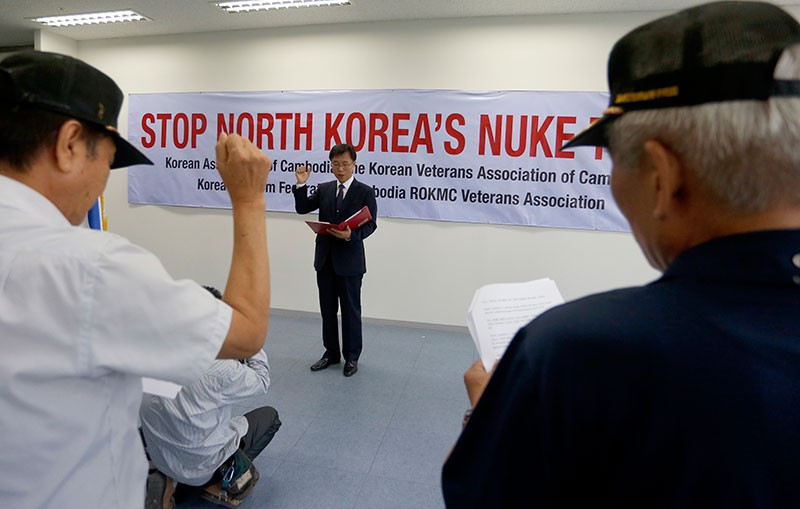A reported threat by North Korea to commit terrorist attacks in Cambodia comes amid a shift in the Cambodian government’s focus from a historical friendship with Pyongyang to a deepening diplomatic relationship with Seoul.
—News Analysis—
Citing an unnamed senior South Korean intelligence official, the South’s JoongAng Daily newspaper reported on Wednesday that North Korean operatives had been dispatched to Cambodia, Laos and China with instructions to carry out attacks on defectors, as well as South Koreans visiting and living in the countries.

A spokeswoman for South Korea’s Ministry of Unification declined to comment on the threat of attacks because it had not been covered by North Korean state media, which would amount to confirmation.
“Nothing has been confirmed,” she said, declining to provide her name.
The South Korean Embassy in Phnom Penh declined to comment.
Roger Baker, lead analyst for the Asia-Pacific and South Asia region at intelligence company Stratfor, said in an email on Thursday that South Korean intelligence reports had a “mixed record” of accuracy.
“One cannot entirely rule out the potential for some sort of activity, but action against ROK [South Korean] citizens unconnected to defector networks does not seem to fit DPRK [North Korean] priorities or patterns currently,” he said.
The newspaper report, which said the threats were prompted by the defection of 13 North Korean employees of a state-run restaurant in China via a Southeast Asian country, follows the tightening of diplomatic ties between Phnom Penh and Seoul.
During a visit to Phnom Penh in June, South Korean Vice Defense Minister Hwang In-moo successfully courted Cambodian support for efforts to thwart North Korea’s nuclear ambitions following a series of weapons tests by the North.
“Cambodia considers these actions to be a violation of the Security Council of the United Nations and appeals for the resumption of six-party talks as soon as possible,” read a June 29 statement from the Ministry of Foreign Affairs.
The South Korean Ministry of National Defense said in a statement of its own that Prime Minister Hun Sen was re-examining Cambodia’s relationship with the North.
“With respect to cooperative exchanges with North Korea, he expressed his stance to adjust such matters,” it said.
The statement also said South Korea would send a military attache to Cambodia in August and that the two countries planned to sign an agreement formalizing military collaboration.
The two countries resumed formal diplomatic ties in 1997, more than 20 years after the South Korean Embassy closed during the Khmer Rouge takeover of Phnom Penh. Direct foreign investment from South Korea is now second only to China in Cambodia, according to the South Korean Embassy’s website.
The relationship was slow to develop in part because of the late King Norodom Sihanouk’s longstanding friendship with then-North Korean leader Kim Il Sung.
The pair “shared a mentality of ‘small state’ surrounded by dominant neighboring countries,” according to Sitthiphon Kruarattikan, an associate professor at Bangkok’s Thammasat University who specializes in Cold War relations.
Kim Il Sung built his friend a 60-room mansion in the North Korean capital of Pyongyang that became an on-and-off-again home for the king after his exile in 1970, Mr. Kruarattikan wrote in an essay last year. When King Sihanouk permanently returned to Phnom Penh in 1991 after the signing of the Paris Peace Agreements, he was flanked by 35 North Korean bodyguards.
As the king’s influence on Cambodian politics waned in the 1990s, the countries began to drift apart.
“Without the two leaders’ linking arms,” he wrote, “the two countries’ destinies rarely link to each other.”
(Additional reporting by Kuch Naren)



